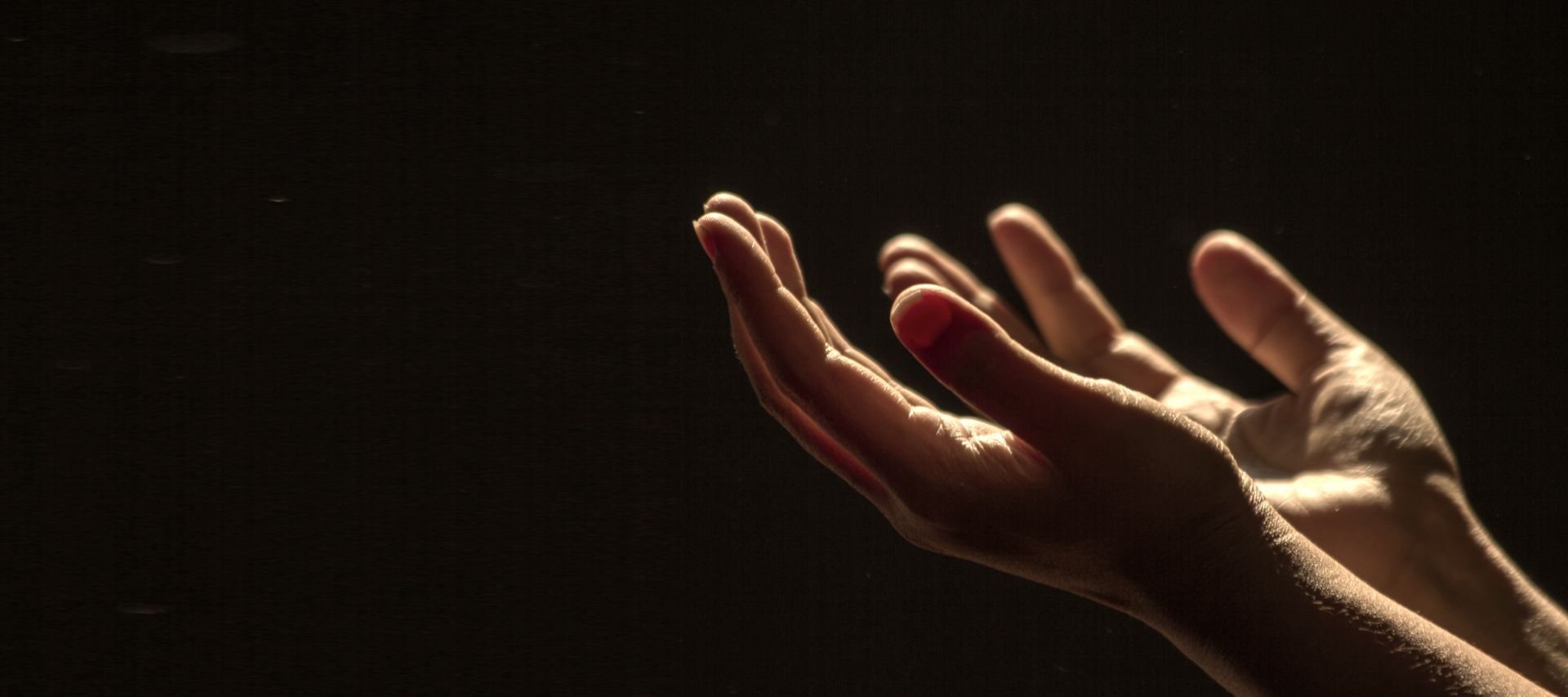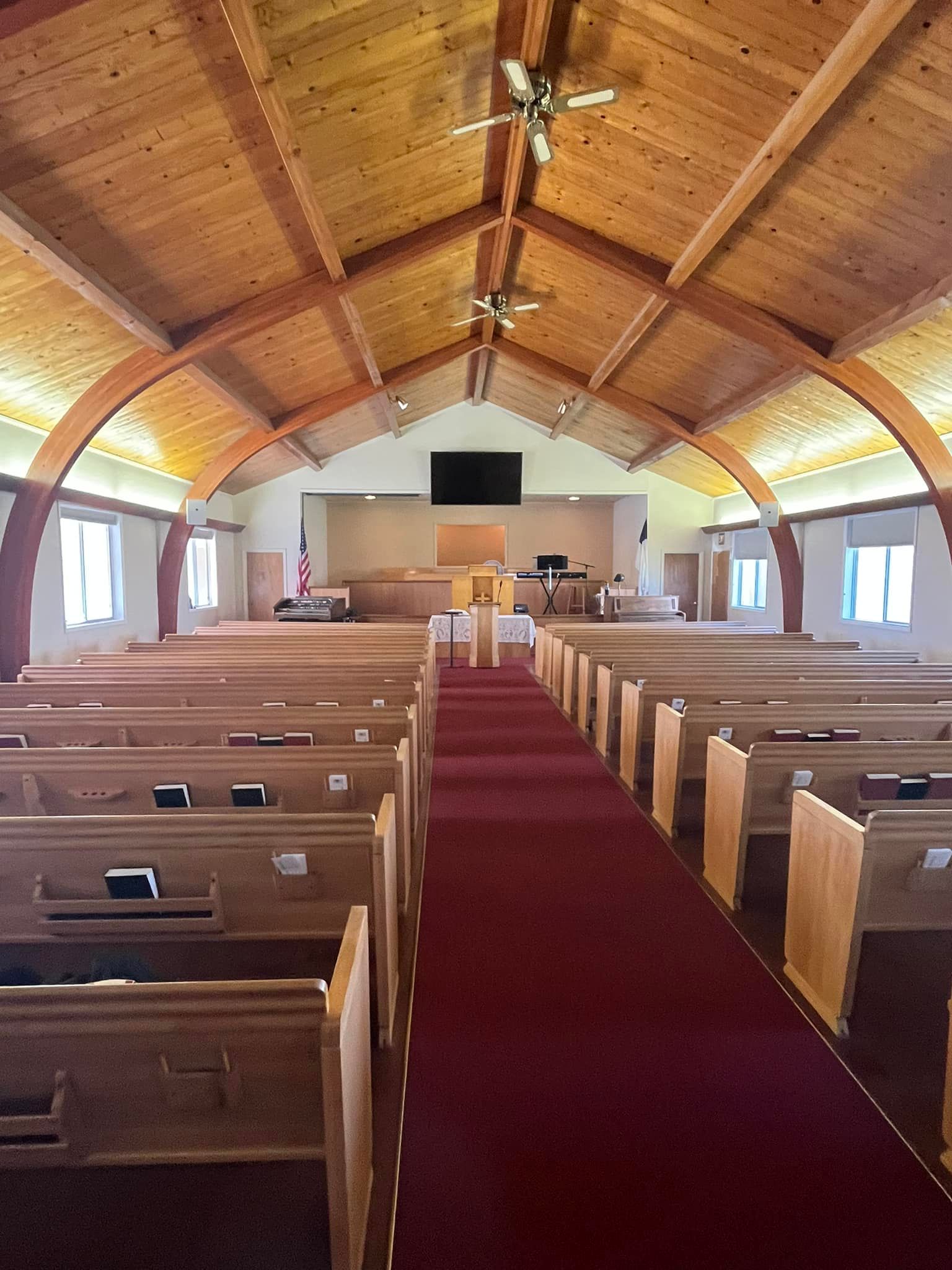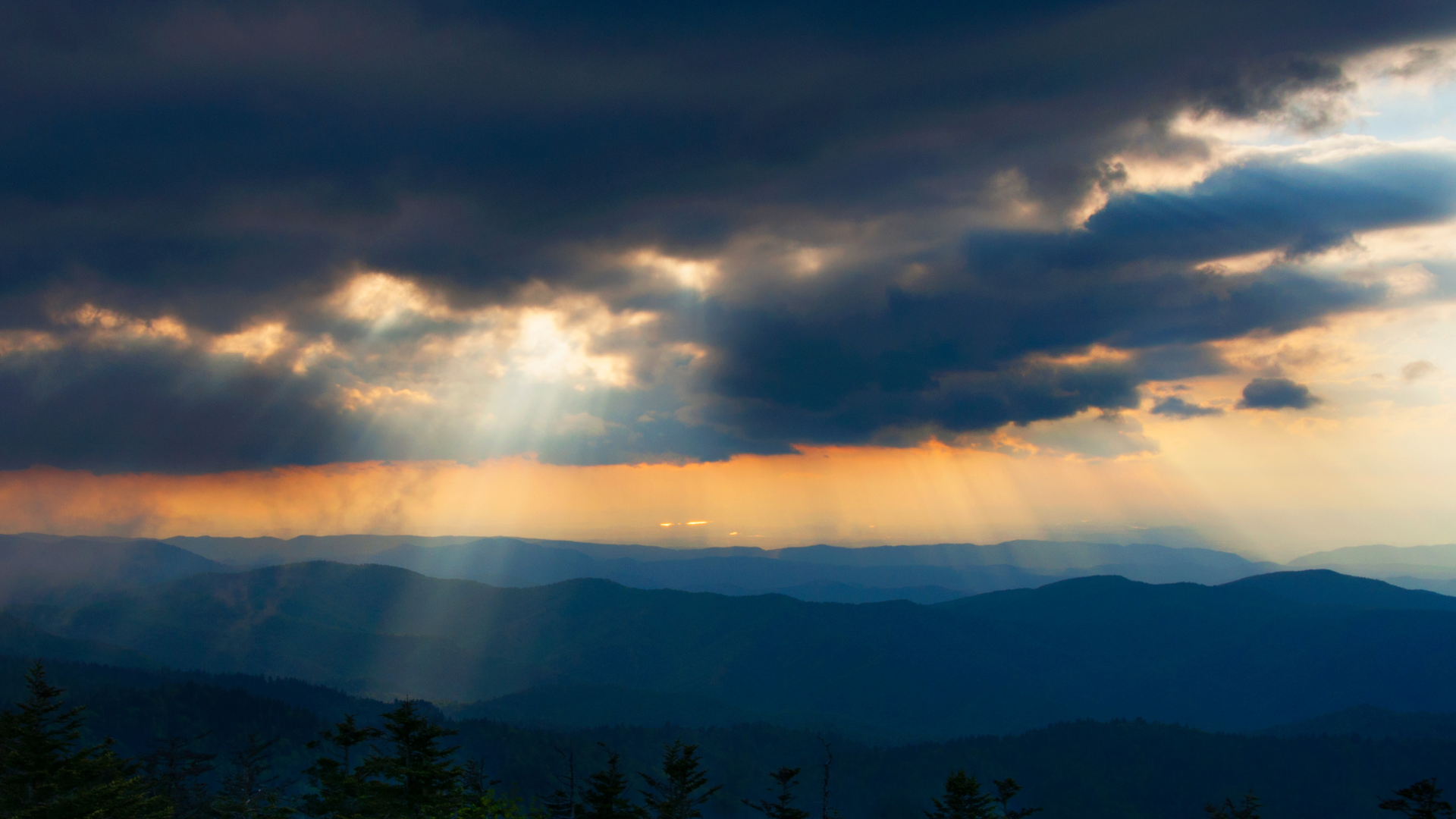Pastor's Corner
ARTICLES

August 5, 2024
Sometimes one man, and one man alone, sees a thing as it truly is, and sometimes no one else in the world cares or attempts to comprehend the vision of this solitary individual. The above phrase from Wordsworth’s poem speaks to this individuality of experience. It was named for a small flower, the Celandine, which normally goes unnoticed by most people, but when observed closely reveals an intricate pattern of color and complexity. It was interesting enough to draw him into a poetic essay regarding the beautiful and brilliant things that ordinarily go unappreciated by humanity. Wordsworth notes the possibility that he might be alone in what he calls a moment of “pleasure,” of more than just appreciation, using the recollection of a memorable book as an example of this revelation. Have you ever had one of those moments, moments when you were startled by the fact that you were the “only one?” Any one of us, no matter how dull, can hopefully recall at least one thing we have seen that would fall into this category, things that we considered beautiful or illuminating but perhaps no one else has appreciated. Sometimes they might be witnessed in nature, initiated by God, and sometimes they might occur synthetically, at the hands of man. Yet when you observe them it crosses your mind that you may be the only one who will ever appreciate them. Even sitting in a crowded theater, the entire audience paying rapt attention, there can be moments that you consider brilliant, humorous, or beautiful but go unnoticed by everyone else. ARE WE EVER THE “ONLY ONE"? In case you’re wondering where I’m going with this, we’re talking about that aspect of the human experience identified as “character,” either good or bad. Character is that elusive quality which is often defined in us in our worst moments, when crisis or external pressures are their greatest, and when we may be challenged to stand alone in our convictions. It is also observed in us in our best moments, when we are inclined to go along with the flow, enjoy the buzz of an exceptionally good moment, yet are strangely called to step out of this moment and follow a solitary cause. From childhood we are taught the importance of community through organized team sports, councils, committees, the voting process, and religion (Sociology 101.) We are taught that “no man is an island,” that one cannot stand alone, and that strength comes in numbers. It is important to feel supported in our endeavors by those we know, love, and trust. Without these we might never succeed or overcome the obstacles encountered in the course of our lives. Our community, family, friends, and colleagues are essential to our well being. Also, by and large these groups teach us the specifics of beauty, goodness, and desirability within their broader function as circles of influence. Consequently we also attempt to acquire or possess “things” with those acceptable qualities in order to secure the approval of these circles. If you doubt the validity of this last statement, consider the pursuit of “style” and fashion, particularly among today’s youth. Now comes the odd part. It is true that we live in a world of cooperation, consensus, teamwork, and “majority rule” in a democratic society. Yet, in our individual studies of the Bible, from Genesis to Revelation, does anyone recall a single occasion when the will of the majority was the right one? Were Joseph’s brothers right in throwing him in a pit and leaving him for dead because he was a self-righteous bore in their opinion? Were the Israelites correct in casting an idol of gold in order to party in front of it while Moses was gone a little too long on the mountain? Were the Israelite kings justified in threatening and killing the prophets in defiance of the edicts of God because the nation wanted to worship other gods and idols without being judged? Were the Saducees and Pharisees doing the “right” thing in conspiring to get rid of Jesus when He refused to be a team player? Obviously not. Even in those cases when the Israelites appeared to come together in acceptance and support of the sovereignty of God, these decisions were forced, as a result of impending destruction or oppressive captivity. In fact, you will only find one instance in scripture that really qualifies, that being the national repentance of Nineveh in Jonah’s time. Yet even this repentance came from the very real threat of destruction issued by the prophet. Except for those rare and notable examples of national or community bravery in the face of grave challenges, majority opinion has ordinarily been opposed to what we now see in retrospect was the appropriate and morally correct choice. Odd isn’t it, that though we live in a world of “consensus” and “majority rule”, there is little historical validation for the integrity of those concepts? They inevitably result in the deterioration or, at best, the mediocrity, of an organization, endeavor, or community. This concept is foreign, though. After all, we have been taught, as already mentioned, that our strength is in our community, and this is not a false teaching. Yet inevitably, that strength is misapplied, as the “will” of the community is corrupted. The real “Aha!” here is the realization that “groups” of people, regardless of number, are not responsible for the initiation of the great notions of history. Individuals are. All the great endeavors of history started with one person. What does the “Source” say? Inevitably I have to come back to the scriptures in order to get a handle on what I believe is the ultimate truth. And, I would like to gain some personal insight also. If there is truth to be searched for and found, is there also any corresponding response or action required on my part? So then, what does the grand “Opiner,” God, have to say about all this? In the 2 nd Psalm we hear the following warning to the councils and governing bodies of the world: 1. Why are the nations in an uproar, And the peoples devising a vain thing? 2. The kings of the earth take their stand, And the rulers take counsel together Against the Lord and against His Anointed: 3. “Let us tear their fetters apart, And cast away their cords from us!” 4. He who sits in the heavens laughs, The Lord scoffs at them. 5. Then He will speak to them in His anger And terrify them in His fury: 6. “But as for Me, I have installed My King Upon Zion, My holy mountain.” . . . 10. Now therefore, O kings, show discernment; Take warning, O judges of the earth. 11. Worship the Lord with reverence, And rejoice with trembling. 12. Do homage to the Son, lest He become angry And you perish in the way, For His wrath may soon be kindled. How blessed are all who take refuge in Him! (Psalm 2:1-6, 10-12,NASV) This poem, though several thousand years old, speaks to a constant condition, seen Biblically from the time of Nimrod and the tower of Babel to the Roman Empire of Paul’s time. Kingdoms have and will continue to conspire in retaliation to the sovereignty, and even to the idea, of God. When Jesus sent His disciples out into the “world” He issued the following warning: Behold, I send you out as sheep in the midst of wolves; therefore be shrewd as serpents, and innocent as doves. But beware of men; for they will deliver you up to the courts, and scourge you in the synagogues; and you shall even be brought before governors and kings for My sake, as a testimony to them and to the Gentiles. (Matt. 10:16-18, NASV) When Jesus said, “beware of men”, he was speaking primarily of the councils of men, although individuals, particularly the leaders, also pose a threat as they are threatened by any doctrine of true righteousness. So, now that we find ourselves in the midst of this world of power-brokering, ambition, and saber-rattling, what can we possibly hope to accomplish? Remember Jesus said “I send you out as sheep in the midst of wolves.” Oh, that sounds encouraging, particularly when He also said that we would be delivered into the hands of these wicked councils in order to be a witness for Him. And here is where “character” comes in. Dallas Willard, in his book Renovation of the Heart, identifies the faithful as “Children of Light” in an otherwise dark world. He says that we “are beyond the point where mere talk-no matter how sound- can make an impression. Demonstration is required. We must live what we talk, even in places where we cannot talk what we live.” (P.231) I recall that someone once said, “character is measured by that which we do when no one else is looking.” I would like to go a little further with that and add that character is also measured by our actions in the face of overwhelming pressure. In other words, when we are challenged or even threatened to go along with the majority opinion, despite our personal convictions, our resolve to take a stand for these convictions will be counted as character. We might find ourselves challenged in the work place, at home or with our extended family, in social settings, and even at church. Yet if we stand firm on the real issues of righteousness and faith in our transcendent God, this will be counted as character, and it is ultimately this trait which will measure our faith. As we hear and observe in our own community of faith, whether a church or home group, we then are responsible for actions in concert with these observations. Now here’s the deal We cannot gain that dimension of character that I have been alluding to without the intervention, and even the filling, of the Holy Spirit. We cannot get there on our own. Borrowing again from Dallas Willard, he indicates that “the mistake most commonly made by believers and others today,” is that they have no understanding “of the presupposition of inner transformation into Christlikeness.” (P.223) As humans, our conscience alone will not suffice to make us “good” people. He adds that this dimension of “Christlikeness” occurs as a result of the ongoing work of the Holy Spirit, called “sanctification.” Over the last several hundred years theologians have worked so hard to detail their individual concepts of the doctrine of sanctification that it has become completely convoluted, and I won’t begin to trouble you with the arguments. As a general definition, though, sanctification is the maturing and transforming work of the Holy Spirit accomplished in the believer. But this is the dimension that makes it difficult: God wants all believers to be transformed, or sanctified, but most believers want to keep some part of the world they find attractive, and consequently never fully submit themselves to this work. In other words, you gotta want it with all your heart and yet your heart won’t want it until you get it. Confused? How’d I guess? There will always be an element of doubt when we step into the unknown, just ask C.S. Lewis, but it is this very area of doubt that God loves to work with. Faith, by its very nature, involves doubt. Some may ultimately get to that place where there is no doubt, but, if so, it comes by the testing of their faith through great trials of doubt. Now we get back to character. When we, as individual believers in Jesus Christ, find ourselves tested regarding truth, morality, love, and forgiveness, and we feel the pressure to “cave in” to the seeming will of the community, our personal faith and character come into play. Obviously not all of the solitary visions of humans are correct, so you yourself must learn to test your own spirit to insure the integrity of your motives. Purely selfish concerns and personal ambition drive many. The devoted Christian walk is not just the product of making one simple decision followed by a lifelong game of miniature golf, with short, easy trails and windmills. Seek the solitary vision which God has for you, test yourself regarding your motives, and remember that you may experience it alone, as Wordsworth expressed.

August 4, 2024
My current study has been in the book of Ezekiel, which has been a slow process, attempting to interpret its primarily metaphorical nature in terms which apply today. One particular theme has been coming to my attention: That both the world at large and the microcosm of Israel would know by observing the work of God in rescuing and restoring Israel that He in fact is the Lord their God. The phrase “they will know that I am the Lord, their God” appears throughout the book, and always applies to an event which can only be ascribed to God. Lets see if I can bring this even closer to home. Throughout the course of revelation God has manifested Himself in several manners, from direct revelation of His presence as in the case of Moses, through the prophets of power such as Elijah and Elisha, down to the poetic prophets such as Isaiah, Jeremiah, and Ezekiel. This variation of God’s presence in the world continued through the person of Jesus and the apostles. Yet one theme has existed throughout these revelations, that our God is a God who reveals Himself most poignantly to exiles and outcasts, not only of the twelve tribes of Israel, but of the whole world.

July 31, 2024
So today, Lord, what is my point? What difference can I make in this world? Do people today really want to hear the truth? Ever ask these questions, particularly about this time every year? I sure hope so; otherwise I’m in a company of one. Think about it: its almost rhetorical to ask if people do not want to hear the truth. Of course they don’t, it moves them away from being the central purpose of their lives, makes them “ungods.” Even most of us who confess Jesus as savior still treat Him as a one day a week problem rather than an everyday of the week solution. But particularly at this time of the year, when you see signs proclaiming “Jesus Is The Reason For The Season”, people are really preoccupied with indulging everything but Jesus. Oh gosh, am I preaching to the choir again? Sorry. The only ones who listen seem to always be the ones who’ve already heard. But catch the rest of it anyway. Even we who claim to be dedicated to seeking the Lord and His ways can be caught up in the reasoning and hype of worldly endeavors: " See to it that no one takes you captive through philosophy and empty deception, according to the elementary principals of the world, rather than according to Christ . . .” - (Col. 2:8) Try this: sometime in the next couple of weeks find a nice spot for a cup of coffee or tea at one of the larger malls, where you can observe the crowd, then spend an hour noting the behavior of all those who come and go. Assume the position of a neutral observer and take notes. Of course this means that you will need to take time from your busy schedule. But that’s the point, get out of the loop in order to see the futility of being in it. Take this time to get a little glimpse of what God sees when He looks down upon the sea of shopping, cooking, wrapping, and opening human creatures. Try to be open in your observations while also looking for latent signs of benevolence and love.

July 30, 2024
NOTES FROM THE NORTHWEST, Dec 1, 2002 Time for my latest musings. After a somewhat frustrating Sunday, I was sitting down to a triple shot caramel latte at the Caboose Lady, a local coffee spot, considering that the world was not conforming itself to my blueprint and pondering what new input on my part would change that. Being a reasonably good self-observer, it no longer surprises me that the world seems to refuse to rotate around me, considering all the harangues and sermons on humility and human frailty. But, from time to time I still find myself irrationally anxious over that fact (and don’t even try and tell me that you don’t ever experience this.) So I took a little time for some centering, letting go of the things over which I have no control, which is basically anything other than myself. Anyone in program recognizes these as “other people, other places, and other things.” The next step was to consider the admonition from Matthew 6:25-34 concerning the futility of anxiety, which basically comes from concern regarding that over which we have no control. Interestingly, as beautiful as the 33 rd verse is “Seek ye first the kingdom of God and His righteousness, and all these things will be added unto you (KJV)” it is also extremely difficult to follow when you don’t let go of the anchor of anxiety. The following is somewhat theoretical, and yet I have found it amazingly true as a feature of the occasional irrational behavior of many individuals. From the traditional psychological perspective (slightly embellished by me) most children reach a moment of revelatory awareness, which Freud termed the “Rapprochement sub-phase”. This event occurs in children somewhere between the age of 18 and 24 months and is marked by the sudden realization that the universe is not complying with their wishes. At this juncture a child will ordinarily return to his or her mother demanding that she set things in order. Mom, after spending nearly two years with her demanding infant is neither capable nor willing to comply with this demand. The universe of the child will not return to its former compliant state, and will ultimately demand the submission of the child to a new and complex set of rules. After some frustration (you mothers can read; shrieking and tantrums) the child normally reaches an agreement within his or her psyche to conditionally accept this new state of chaos. But despite this conditional agreement in the infant state of our development, we humans still fight with the frustration of being dethroned as the god of our little universes. Now don’t get all worked up if you don’t like the idea of this theory. It’s only theory, after all. But look around your world and consider the behavior of your neighbors, co-workers, friends, and mates. Perhaps you might even take a look in the mirror and consider your own behavior. I did. And what I became aware of was what I was not really noticing when I was too busy trying to control those things in my personal life over which I really have no control. I try to stay informed, paying reasonably close attention to world events and changing conditions, skipping over the meaningless news such as the personal lives and problems of sports stars, media personalities, and any other glamour types. Yet, as a rule, I am also too insulated from these events to really let them sink in. I spend so much time vainly absorbed in the irritations of my own life that I fail to pay valid attention to the rest of the world. And what a failing this is, for one who seeks to be conformed to the mold established by Jesus, who was acutely aware of the world around him on both the macro and micro scale, and who was also aware of his true role in this world. What happens when we come to terms with our arrogant condition, stop looking at our little self-defined world, and take a clear look at the world at large? What do we see and how do we respond? After checking out the sports and celebrity news on AOL did you notice the latest statistics on the HIV virus? Did anyone happen to catch Ann Coulter’s op-ed piece on the latest rampage of violence by the “Religion of Peace”, which resulted in the deaths of over 200 people in Nigeria during the now-relocated Miss World pageant? Are we moved by the news that in Rio deJaniero hundreds of thousands of children, both orphaned and exiled from their homes, are clandestinely targeted by police for extermination? Obviously we would respond with concern over these news items, though with the question of what possible good could we do in these cases? After all, it’s hard enough trying to manage our well-insulated little lives, isn’t it? Oh my goodness! Homework, garbage pickup, groceries, bills, lawn mowing, car washing, holiday planning, kids fighting, etc. This is not meant to trivialize our lives, we are all important. Yet, there will soon be seven billion of us on this planet. Think about this. How many more people would send money to a fund for the preservation of orphaned puppies and kittens than to funds set up to help with these worldwide atrocities and epidemics? And after considering the glaring difference between these two options I’ll bet most people would simply put this information into the “so-what” file and go on with their insulated lives, slightly more frustrated than before. Exactly where the prince of this age wants us to be, frustrated and apathetic. But, and here’s the big “aha” that we need to come to terms with, somewhere between the “micro” world which constitutes our personal daily life, and the “macro” world with problems far too big for any one of us to help with, lies the world within these boundaries which we can, in fact, touch and impact. But, when we let go of the frustration of trying to “control” our own lives and get a hard, long look at the “macro” world, the sudden shock of seeing so much that is in need can be even more frustrating than all our failures at managing our own “micro” lives. This may even occur on a daily basis to some people, for whom the television news with all its portent and disaster occupy one end of their mind, while the mounting anxiety of an out-of-control family life occupy the other. They frenetically switch from one extreme to the other without any resolution. “Oh great,” you say, “so if we let go of the frustrations of our personal lives we are just met with larger frustrations when we encounter the really big world?” Once again, exactly where the prince of this age wants us to be. Where then is the world within the boundaries? How can we find that place where we can have impact, where we are no longer frustrated and apathetic? Here’s the rest of the “aha,” its like a big funnel which we hang over, with one hand clinging to our personal anxieties and the other to the anxieties created by the great big world. Let go and you’re there. Give up; quit staring at all the broken stuff you can’t fix. This is a real faith move. Suddenly, the world you see around you appears differently. It is no longer an obstacle course keeping you from your personal life. All that you formerly ignored or thought disgusting is instead a world filled with chances to behave as Jesus would. Where did Jesus hang out, and with whom did he spend most of his time? Where would he be today and with whom would he be? Remember Matthew 6:33, “Seek ye first the kingdom of God. . .” Guess what? That world around you is the kingdom of God. Jesus brought the kingdom to earth with him, he drew in those most in need of him and he is still drawing them to himself. Unless we get there we cannot serve God, we just spend our days saving ourselves over and over, fearing that we will lose our grip on what little we have. Now here’s the kicker. The rest of verse 33 reads “and all these things shall be added unto you.” In other words, if we give up the anxiety associated with our everyday existence, and if we seek the kingdom of God by looking outside our insulated lives, then God will meet all the needs we had previously been anxious for. How many times have we heard this in one fashion or another? But its like letting go, a faith move, and we have to risk and trust in order for the promise to become reality in our lives. I’m not going to belabor this point by suggesting what we do when we get this look outside. You’ll figure it out if you let the Spirit lead you there. Finally, this comes back to where I started this afternoon. The question is “are you willing to give up being the god of your own life?” Easier said than done, but do-able. BillZ

By Seungyong Lee
•
July 29, 2024
Today, Sunday, I took a drive up the Coquille river, past the headwaters to where the valley narrows near the crest of the coast mountain range, past small, mostly deserted old communities with names like Bridge, Remote, Camas Valley, Tenmile (because its ten miles from the next town), and Winston. I have driven this road hundreds of times in my life, and know every valley and bridge across the river, even where the old ones were that are now gone. But the countryside was more beautiful than I have every seen it, all the maples and alders have turned, and are brilliant yellow and orange against the deep green of the Douglas firs. And the entire atmosphere was incredible, a crisp and clear autumn day with the smell of every tree in the forest right in my face. God apparently saw fit to take me off by myself when what I originally wanted was to talk to lots of people all at once. When I thought I needed a little more social contact than I have had lately with a shed full of power equipment and garden tools, God thought differently. It was in His mind to get one on one with me without the interference of other people, and away from a still long list of chores, which I think He wants to do with all of us from time to time. So I started my little journey with a big bag full of worries, concerns, and priorities, passing judgement on myself along the way for failures and failed commitments, confessing in my mind to all those whom I have disappointed and hurt in the course of my life. But by the time I reached Camas Valley, the beauty of all the creation of God finally sank in, and I felt God give me a big “so what?” to all the problems I was dragging around. He had obviously heard my confession enough to tire of it, and He wanted me to pay attention to what He had done, not what I had done. Honestly, I am amazed that God could have enough interest in me to do this, but there He was, right in front of me, saying, “I did this, how about paying a little attention to me, considering what I can also do in your life if you let me.” Maybe I got the point, and maybe its still sinking in. A lot of what God has been trying to accomplish in me is still sinking in. Its my prayer that all of you can get your opportunities (there are many) to experience God when He tries to get your attention. You are each one of God’s beautiful creations, and a big part of what He wants from me is to pay attention to you, and to pray for you, as we are all to do for each other. Listen, when you trot out your list of worries and concerns and He responds by saying “so what, look what I have done, and believe what I can do for you.” God bless you all. I love each one of you. Bill Zinn

July 27, 2024
I wonder what God is doing today? Sure He’s still up to all the usual “God” stuff like holding the Universe together, listening to five or six billion prayers, and making sure His “action plan” is being carried out. But when He gets done with all that is He going to click on Fox News to see what’s going on in Iraq, to see how “our” boys are doing, and to see what the casualty count is? What’s His take on all this? How schizophrenic is the view He gets of this world? I don’t know for sure what the world looks like out your front window, but let me give you a look at mine. While at least 5 TV stations carry full time coverage of whatever war is going on, which all of you can also see, I am looking out over a peaceful country landscape. Just 5 minutes ago I watched two deer, a doe and a yearling fawn, walk peacefully by, at least until the dogs began barking. Then they turned up the hill into the woods. That’s good, at least they didn’t head for the highway. The rain was very heavy last night, and the deer, which forage for food at night and sleep during the day, wouldn’t lie down at dawn because the ground was too wet. So, my warning for the day is to watch out for deer on the road as I drive into town later. Tough, huh? If it weren’t for the news I would assume from my perspective that all the world is at peace. But it isn’t. Somewhere someone is crying, or dying, or running, or mourning, or giving up. What can I do then? I wonder what God might want from all of us who are still going through our daily routines, only mentally aware of problems somewhere else in the world? After all, as we each become aware of the events in the world, we are also aware that we are each only one person. What could God possibly want us to do about things going on half a world away? I also wonder where God’s attention is focused? I don’t mean to suggest that for a moment He has forgotten or neglected any one of us, but it seems that we are witnessing events in the news that have immense implications on the religious and spiritual focus of the world. There appears to be much more at stake that just territory and military power, and even more than the weight of the lives that hang in the balance. Despite the overwhelming negative opinion and criticism of the world, and despite our own ambivalence to war, we are witnessing actions, which demonstrate the character of our nation and its leader. Character, as I described in my last letter, “is that quality which is most effectively defined in us in our worst moments, when crisis or external pressures are their greatest, and when we may be challenged to stand alone in our convictions.” Despite that, I am not writing this to voice or encourage a particular political or moral stand regarding war in general or any particular war, but instead to focus our attention on matters that are weighty and consequential to God and His purposes. We follow in the footsteps of our spiritual and moral guide, Jesus, and He did not dictate much regarding politics or the coming and going of nations and kingdoms. When being tested by the Pharisees, He replied “Then render to Caesar the things that are Caesar’s; and to God the things that are God’s. (Matt. 22:21) Yet he prefaced this response with the critical question “Why are you testing me, you hypocrites.” (v.18) He knew that they were less interested in the moral integrity of a nation or kingdom than in the personal benefit or loss the support of any issue might incur. They were much like the political pundits of today, using current affairs as a platform for self-promotion and control. They didn’t and don’t much care if an idea or “fact” is true or not but promote it as truth for the sake of the power they gain. He did say, though, that we are to pay attention to the affairs of the world in order “that no one misleads you. For many will come in my name, saying ‘I am the Christ,’ and will mislead many.” (Matt 24:5) The household of Jesus is still being built, and will continue to be built until His coming, and that is to be our primary goal as His servants. (v.45) Today, when you pray to God, what will you say? Will you repeat the same prayers for forgiveness, for blessing, for safety for your family, maybe some little extra prayer for our young men fighting a war on another continent, and, Oh yeah, please help our President. I know that some very faithful prayer warriors are spending all their extra time praying that God will prevail in the midst of this current conflict and controversy, that He will be glorified through its conclusion, and that massive destruction and death will be averted. But I also know from my own self-centered perspective that I still tend to begin my prayers with everything that concerns me personally, and then get on to issues of importance in the larger world. I wonder if that’s what God wants? Do we believe that God has a plan and a purpose for each one of us? I can picture a lot of heads shaking up and down, but do we really believe it? Then, if so, what is it that we are to do? I have this mental picture from probably hundreds of scenes in movies and television shows, involving a crisis, any crisis, a hero, and supporting roles. (I’m sure each of you has seen these same scenes and may even remember them humorously.) When one of other cast asks the hero what they might do to help, the hero replies “pray,” as if to reduce the utility of prayer to a supporting role. In fact, it is always God who does the work while our feeble attempts to be heroes generally fail. Our true role in all of this is to be fervent pray-ers while God does the work that must be done. As for me I clearly hear God calling me to seek Him in this peaceful place, to focus my attention on Him, and to lay the burdens of the world as I know them at His feet. He doesn’t need me or my prayers in order to get on with His plans, but He wants me to pray. Check it out, He may want you to also pray for things and people outside of your immediate life. Be blessed, Bill Z

July 26, 2024
What is it we are to remember in this season of celebration and pageant? Annually, amidst all the hype of commercialism, the apparent Christian world presents the image of a helpless child, couched in all the stories of human heroism and selflessness, hoping to bring out the best in us amidst rejoicing and peace. This, of course, always leads up to the image of a celebration around an over-decorated evergreen with happy people drinking nog and grog, watching children tear into a pile of brightly wrapped indulgences, followed a week later by a night of sparkly over-indulgence. Does anyone find it sad that as soon as Christmas day is done almost everyone forgets it and moves forward toward the next celebration? Though not too troubling, I’ve always found it somewhat a reversal of priorities that we of the faith revere this day, Christmas, or the coming of the anointed child, above the day, Easter, or the sacrifice of the anointed one to atone for the sins of the world. Yet it is that way, and despite all of the criticism of the secular world, and the constant lobbying to remove Christian imagery, the focus persists, and the world takes notice, both critically and curiously. But what of us? Throughout the Old Testament God allowed for special days, and occasionally years, of jubilation and celebration for the purpose of remembering critical changes and events in the history of His chosen people. Some of these occasions were for the express purpose of setting right old grievances and wrongs, and to recall the relationship between God and His people. So, in this age wherein the faithful are spread all over the world, what are we to recall and what are we set right? After all, what is God to us, and what are we to God? Right now, a great deal of the world’s population is in the midst of Advent, or Christmas, celebration and preparation for the upcoming New Year celebration. At the same time another large part of the world’s population is conducting business as usual, whether in sweaty labor or an air-conditioned office. And, there is a small but growing number that is greatly irritated that any of these things is taking place, offended that there is joy or satisfaction anywhere in the world. They would, by either legal or illegal means, political power or terrorism, be satisfied only when anarchy and desperation rule the world. If God walked in our midst today, how would he react? If Jesus dropped in for a visit would we be too blind to see him? I recall a vivid dream I had several years ago. The next morning I wrote down my recollection, and although I’ve misplaced my notes the memory of this dream has always persisted. I somehow found myself at a hospital, visiting, which was not a peculiar event for me considering my years as a Chaplain. I found myself in a gray corridor with weak lighting, and needing to wait I sat down on an old wooden bench. While waiting, a very old man approached to also sit down. I noticed that he looked weary and walked with a cane, his overcoat was once luxurious but over the years had become worn and rumpled. As he turned to sit it appeared that the bench, straight-backed and hard, caused nearly as much pain as standing seemed to. He sat silently for a moment as I uncomfortably gazed up and down the corridor, which now seemed to stretch on and on, into the darkness, with door upon door and room upon room. When he finally turned to speak, he removed his hat and apologized for not greeting me when he approached. He said he had been to visit his children, all apparently in the hospital. Yet, he said with a great sigh, they had all forgotten him, their lives had moved them away from home many years ago and the memories of their childhood had faded away. At that point I turned to him, sensing his grief and weariness, momentarily putting aside my own preoccupation with my duties, and as he noticed my interest in his story, he continued. He related the memories of his past, of raising his large family, and of how they all finally left home with promises of bright futures and personal successes. But through the years these turned into blind ambition, wealth seeking, and empire building. Their individual quests for power and recognition finally took their toll, and they all found themselves in this hospital, sick and dying. He had all their names and still brightly remembered all of their faces. He had come with great anticipation, hoping for a joyous reunion, and to invite them all to his waiting home, to live and recover in the hospitality of his love for them, and to share once again in his wealth. But as he entered room after room he was rejected as a stranger, each of his children refusing to admit to his own frailty and sickness, each still pursuing the goal of personal achievement. They did not remember, nor did they wish to remember, the father who had nurtured and provided for them as children. They were blinded, and would ultimately be betrayed, by their own ambition. And so he sat, this sad old man, now facing the grief of his own abandoned life and the isolation that each of his children has chosen for himself. He became silent again, yet I continued to study him. I noticed his face lined with the scars of character, and his hands worn from years of personal labor. He turned his hat in his hands and grasped his cane to rise, and I put my hand on his shoulder to ask him to stay for a few moments more. I thought to myself what grace this old man has to share his story in such openness with a stranger like me. And as my hand rested on his shoulder I realized that I had come to visit my own brothers and sisters, and that I too had forgotten my childhood and my own father. As his face slowly turned back toward me and I once again saw his eyes, I felt the rush of memory come upon me. In weakness I fell to my knees as I realized that it was my own father sitting in front of me, that I too was one of the children on his list. Through my tears I asked if, after all these years, he might consider taking me home with him, to once again enjoy the comfort of his care. Now this was only a dream of mine, and as such only has the value of a dream. But it has stuck with me and remained clear, unlike most dreams, which fade. Therefore it is important to me, and I take some risk in sharing it with others. But I shall. For me, I see the immense sadness and grief which God has borne over the centuries for all those who are now lost forever, for those who have forgotten Him. I also imagine the great joy at the returning of even one of His lost children. Perhaps it is arrogant of me to relate such a dream, or even to have such a dream. After all, how could God, in all his greatness and glory, consider stooping to one such as I, and moreso, to ever present Himself in such a feeble and broken state? And yet Jesus, the Anointed One, whom we claim to worship, was burdened with the weight of the whole world’s sin, and filled with grief over those who were lost: he was a man of sorrow and acquainted with grief. . .He was despised and we did not esteem him. (Is. 53:3) This Jesus, who is portrayed at this season as an innocent, helpless child, upon whom gifts were bestowed, is the same one who was later rejected by his own, tortured by strangers, and died in shame for the sake of his children. In death he opened the doors of his house and willed his wealth to all those who then, and still today, turned their backs on him. All we need to do is remember him for who he is. And as for me, I will forget no more. May his face be ever present in my memory and in yours. Peace. Bill Z

July 25, 2024
Last Tuesday I received a call from an old friend, Last Tuesday I received a call from an old friend, John Gurney. He called to tell me that his mother, Virginia, had passed away after a long illness. This moment had been coming some time, and, despite the inevitability and the relief from pain and suffering that she felt, was still deeply painful for her family. About 5 years ago her husband died, and she had struggled with that loss herself, always longing to be with him. Loss always hurts regardless of how expected it is. Throughout the remainder of the week I couldn’t help thinking about John and his family. I have known John and his twin brother Reed since I was about two years old. Now, I don’t remember that far back, in case that crossed your mind. But I have a very old photograph, taken by my grandmother, showing the three of us sitting on the front porch of her house. It is one of the few photographs of me as a child that I am not embarrassed by. If you were raised by camera toting parents, you know what I’m talking about. While John and I have been friends for a long time, I cannot imagine two people as different as the two of us. But we kept crossing paths, and ultimately a “passing” friendship became “old friends.” John was born and raised here in Myrtle Point, returned after college, married his college sweetheart, taught school here, and retired here. I, on the other hand, moved just about as often as the seasons changed, a pattern established by my father’s military career. But in 1960 my parents returned here and settled permanently. In High School John and I were occasional friends, socializing some and studying at his parent’s house before math exams. In college we were roommates during our senior year. He went to one college; I went to four before finally graduating. After college I returned to the gypsy pattern in my life, and have not figured out what to do long enough to retire from it. Over the last few years I’ve made it a point to visit he and his wife Karen whenever I get up this way. In all the time I’ve known John I’ve never heard him utter a cross word or criticism about anyone (Yeah, yeah, I know, another big difference.) He has a way of asking about someone he may be upset with, as if he were authentically curious whether their behavior was acceptable or not, yet he would never dare say their behavior was bad. I’ve never heard him say he didn’t like anyone, and he always considers that another may have a reason for his or her questionable behavior. In essence, John is truly the nicest person I have ever met, and I know that it is authentic because he has been that way his entire life. He thinks well of everyone, and would never dream of any harm or retribution coming to another for harm done by them. He never presumes to know more or be more gifted than anyone he encounters, friend or not. He’s also the best fisherman in the universe, though he would never brag. And finally, he’s a great guy, and everyone who meets him likes him. I could say more, but its getting a little irritating. When I think about these differences, it’s beyond humbling, it’s downright embarrassing. Most days I don't think too harshly of myself, but when I use John as a standard I’m out of luck. I am truly humbled by his humbleness, and consider myself uniquely blessed to have him as a friend. (As well as I know him I can probably never let him see this, as he would feel totally embarrassed. He would never want himself on the skyline of anything.) He does have two faults, though. When he gets nervous or distraught he goes fishing or cuts firewood. In a 365 day period he has probably been fishing 350 of those days. Some guys may not think that the fishing thing is a fault, but the firewood thing, my gosh. His entire backyard and about half of his driveway are covered with neat stacks of wood, catalogued by age and type (hardwood, fir, cedar, etc.) When he has something troubling he wants to talk about he will call and ask if I want to cut wood. We’ll cut and split a little, then talk a little, then cut and split a little more. An interesting form of therapy, but it seems to work. Humor aside, this is a man whom I truly admire, and I count myself uniquely blessed to have him as a friend. I have, by far, been the most rewarded by the renewal of our friendship this past year and the time we have spent together, even if we just cut firewood. This time when John called, though, he didn’t want to cut wood. He wanted to tell me about his mother and thank me for being his friend through some of his anguish over her prolonged illness. He had been severely saddened by his father’s death, and I don’t believe he had quite gotten through grieving for him, so his mother’s death just seemed to deepen his sadness. Last Saturday, as I observed John, his brothers and sisters, his family, and other close friends and relatives at the crowded funeral it finally struck me where people like him come from. He was just like his mother and father. His dad was a small town doctor who loved raising his family. His mother, who John was most like, was also someone who never spoke ill of anyone, who dearly loved her children, and who looked for the beauty of God’s creation in everything. Her outlook on life impacted everyone around her and was passed on to her children. The service commemorating her life was held at the little Presbyterian Church where she faithfully took her family to worship throughout her adult life. This little structure had seen the baptism of all her children and the commemoration of her husbands passing, as it had done with many families since it was built. I noticed the sign above the small front entry indicated that the Church was established in 1890. Amazing how long good things last. Another revelation that struck me was that I have only been looking at things when seeking to see God’s hand at work. Things like trees, rivers, sunrises, sunsets; you know, nature and stuff. Yet right in front of me, and probably in front of all of us, are people, human beings, who put the lie to all the secular cynicism about mankind and God’s relationship to us. God created us to love Him, to love one another, and to share this wordless experience with whomever we come into contact with. It is inevitable that we will all err from time to time. We will sin, and we will fail to use sound judgement or exhibit ethical character. But it is not inevitable that we all must morally implode, and utterly destroy the lives God gave us before we see the benefit of His saving grace. Thank God, in fact, that some see by His grace to kneel down and accept salvation even when they are children. Proverbs 22:6 says: Train up a child in the way he should go, even when he is old he will not depart from it. (NASV) Although I thank God constantly for the gift of His salvation to the worst of us, even to tired, old, formerly apostate pastors like myself, I also thank Him that all of the wisdom of the Bible is true. In this instance I have seen it in the life of one man who was raised and trained by loving parents who followed and taught the instructions of their heavenly Father. And I thank Him for my friend John. Be Blessed, BZJohn Gurney. He called to tell me that his mother, Virginia, had passed away after a long illness. This moment had been coming some time, and, despite the inevitability and the relief from pain and suffering that she felt, was still deeply painful for her family. About 5 years ago her husband died, and she had struggled with that loss herself, always longing to be with him. Loss always hurts regardless of how expected it is. Throughout the remainder of the week I couldn’t help thinking about John and his family. I have known John and his twin brother Reed since I was about two years old. Now, I don’t remember that far back, in case that crossed your mind. But I have a very old photograph, taken by my grandmother, showing the three of us sitting on the front porch of her house. It is one of the few photographs of me as a child that I am not embarrassed by. If you were raised by camera toting parents, you know what I’m talking about. While John and I have been friends for a long time, I cannot imagine two people as different as the two of us. But we kept crossing paths, and ultimately a “passing” friendship became “old friends.” John was born and raised here in Myrtle Point, returned after college, married his college sweetheart, taught school here, and retired here. I, on the other hand, moved just about as often as the seasons changed, a pattern established by my father’s military career. But in 1960 my parents returned here and settled permanently. In High School John and I were occasional friends, socializing some and studying at his parent’s house before math exams. In college we were roommates during our senior year. He went to one college; I went to four before finally graduating. After college I returned to the gypsy pattern in my life, and have not figured out what to do long enough to retire from it. Over the last few years I’ve made it a point to visit he and his wife Karen whenever I get up this way. In all the time I’ve known John I’ve never heard him utter a cross word or criticism about anyone (Yeah, yeah, I know, another big difference.) He has a way of asking about someone he may be upset with, as if he were authentically curious whether their behavior was acceptable or not, yet he would never dare say their behavior was bad. I’ve never heard him say he didn’t like anyone, and he always considers that another may have a reason for his or her questionable behavior. In essence, John is truly the nicest person I have ever met, and I know that it is authentic because he has been that way his entire life. He thinks well of everyone, and would never dream of any harm or retribution coming to another for harm done by them. He never presumes to know more or be more gifted than anyone he encounters, friend or not. He’s also the best fisherman in the universe, though he would never brag. And finally, he’s a great guy, and everyone who meets him likes him. I could say more, but its getting a little irritating. When I think about these differences, it’s beyond humbling, it’s downright embarrassing. Most days I don't think too harshly of myself, but when I use John as a standard I’m out of luck. I am truly humbled by his humbleness, and consider myself uniquely blessed to have him as a friend. (As well as I know him I can probably never let him see this, as he would feel totally embarrassed. He would never want himself on the skyline of anything.) He does have two faults, though. When he gets nervous or distraught he goes fishing or cuts firewood. In a 365 day period he has probably been fishing 350 of those days. Some guys may not think that the fishing thing is a fault, but the firewood thing, my gosh. His entire backyard and about half of his driveway are covered with neat stacks of wood, catalogued by age and type (hardwood, fir, cedar, etc.) When he has something troubling he wants to talk about he will call and ask if I want to cut wood. We’ll cut and split a little, then talk a little, then cut and split a little more. An interesting form of therapy, but it seems to work. Humor aside, this is a man whom I truly admire, and I count myself uniquely blessed to have him as a friend. I have, by far, been the most rewarded by the renewal of our friendship this past year and the time we have spent together, even if we just cut firewood. This time when John called, though, he didn’t want to cut wood. He wanted to tell me about his mother and thank me for being his friend through some of his anguish over her prolonged illness. He had been severely saddened by his father’s death, and I don’t believe he had quite gotten through grieving for him, so his mother’s death just seemed to deepen his sadness. Last Saturday, as I observed John, his brothers and sisters, his family, and other close friends and relatives at the crowded funeral it finally struck me where people like him come from. He was just like his mother and father. His dad was a small town doctor who loved raising his family. His mother, who John was most like, was also someone who never spoke ill of anyone, who dearly loved her children, and who looked for the beauty of God’s creation in everything. Her outlook on life impacted everyone around her and was passed on to her children. The service commemorating her life was held at the little Presbyterian Church where she faithfully took her family to worship throughout her adult life. This little structure had seen the baptism of all her children and the commemoration of her husbands passing, as it had done with many families since it was built. I noticed the sign above the small front entry indicated that the Church was established in 1890. Amazing how long good things last. Another revelation that struck me was that I have only been looking at things when seeking to see God’s hand at work. Things like trees, rivers, sunrises, sunsets; you know, nature and stuff. Yet right in front of me, and probably in front of all of us, are people, human beings, who put the lie to all the secular cynicism about mankind and God’s relationship to us. God created us to love Him, to love one another, and to share this wordless experience with whomever we come into contact with. It is inevitable that we will all err from time to time. We will sin, and we will fail to use sound judgement or exhibit ethical character. But it is not inevitable that we all must morally implode, and utterly destroy the lives God gave us before we see the benefit of His saving grace. Thank God, in fact, that some see by His grace to kneel down and accept salvation even when they are children. Proverbs 22:6 says: Train up a child in the way he should go, even when he is old he will not depart from it. (NASV) Although I thank God constantly for the gift of His salvation to the worst of us, even to tired, old, formerly apostate pastors like myself, I also thank Him that all of the wisdom of the Bible is true. In this instance I have seen it in the life of one man who was raised and trained by loving parents who followed and taught the instructions of their heavenly Father. And I thank Him for my friend John. Be Blessed, BZ

July 23, 2024
BEFORE THE THRONE SOMEWHERE, On this earth, on this continent, in this country, in this state, in your city, down the street, SOMEONE, is being pressed down, is being ignored, is being judged, is being chased off, is being abandoned, has been exiled. SOMETIMES, we fear, we cower, we overlook, we excoriate, we label, we’ve hated. SOMEDAY, we’ll plead, we’ll explain, we’ll deny, we’ll beg, we’ll accept we’ll be judged. Bill Zinn

July 22, 2024
Yesterday I had an experience, which convinced me that God answers prayer. He showed me that He lives in the details, in the moment by moment fabric of our seldom exciting, often dusty lives, yet rarely safe lives. He is not simply the force which urged the universe into existence, or an observer who sits idly by as the fate of the world unfolds in front of Him. He is intimately involved with each of our lives and wants us to know that. He also wants us to talk to Him about these details. He may always know what we need and where hidden dangers lie, and could easily make all the adjustments necessary to smooth out the bumps, but he would rather we discuss them with Him. Apparently, He wants a real relationship with us, a theme which we are constantly being advised of by pastors and evangelists. But we seldom learn from the rote advise of others, we need to see the principal in action. I could probably go on for pages regarding the construction of theological opinions and Biblical references, but that would just further my point about not taking sound advice. So, the story tells far more than the theories. Recently I have been busy with a construction project on the family property. Years ago, my father had installed a mobile home across the creek from the main house in order to provide living quarters for a tenant or caretaker. Just as the large farmhouse and acreage has been in my family for several generations, the tenants in the mobile home have also spanned generations, with the current tenant being the grandson, along with his wife, of the first tenant. Things in this part of the world seem to develop long, interconnected histories. But as the years passed, the old mobile home finally wore out, and we decided to replace it with a new unit. This would insure that our tenant, now a close family friend and occasional caretaker for my mother, would stay for some time to come. My brother and I conferred on the scope of the project and agreed on what should be accomplished as an end product. He, being the world hopping corporate executive, then jumped on the company’s rapid conveyance (a private jet) and left me behind to complete the task. Those of you who have tackled even a moderate construction project will have no problem foreseeing what I didn’t. The job quickly reached grand proportions as I discovered that nearly all of the services, electrical, water, and septic, would need to be replaced or upgraded. The last several weeks have involved tractors, excavators, contractors, road construction, building permits, environmental permits, releases from some obscure tribe of native Americans, and weather. Yet the required changes have been accomplished on time, and the project is nearing completion. Finally, yesterday the new modular unit (newspeak for mobile home) arrived for installation, along with a crew of eight. This process required at least 8 people, as they not only were the labor for the leveling and footing installation, they also served as the flag men to stop or slow the procession of logging trucks on the main road. As I discussed the intricacies of the operation with the foreman I noticed that he was the only one on the crew that was under 65 years old, which concerned me some. Had I known this beforehand I probably would have also ordered an EMT crew and an ambulance. It was no small chore for them to guide the driver as he backed this 65 foot long monster off the highway as traffic waited, and then attempt to direct him as he continued to back it up 400 feet of relatively steep, tree lined, country driveway. At this point the task became progressively harder. The back of the new unit wanted to dig into the driveway and the foreman was constantly adjusting the hydraulic tongue on the truck to compensate for angle. To complicate this, one side of the driveway was bordered by a steep uphill bank, while the other side had an immediate drop off. Losing one tire over this drop off would be disastrous and being too close to the other side would risk tearing off some of the siding. The driveway had been checked for accessibility by measuring drop angle and width, but now that the new mobile home was on it, the planned clearances seemed much tighter than expected. Now here is where God got involved. I sat on a stack of plywood slightly uphill from this impending disaster, as an observer. The crew knew what they were doing, and it was my job for the moment to stay out of the way. As I watched, I felt the distinct urge to pray. Nothing specific, just a slight nudge from God, “hey, talk to me about this.” So, I offered a short prayer “Lord, please look after the safety of these men and help us finish this without an accident.” Contrary to instruction, rare for me, I walked down for a closer look, noticing that the rear frame had begun to dig into the gravel driveway and the left three tires under the unit were on the exact edge of the drop off. The crew itself was busy placing metal mats and boards under the tires in order to get the frame lift they needed in the rear. In addition, the tires on the single axle truck(tractor) itself were beginning to spin in the loose gravel. I concluded that they were going to need more than just this in order to finish the task and avoid disaster, but I also knew that they didn’t need another person to stand around with them while they scratched their heads in consternation. But God had planned for this very contingency several weeks ago. The contractor I hired to excavate and install a new septic system had been delayed somewhat due to material deliveries. He should have been finished a week ago, but instead would finish later this week. Consequently, he left some of his equipment on site, including a large 4-wheel drive tractor with a shovel and backhoe, parked uphill from where the mobile unit was perched. And, just as everything began to look really risky, the contractor’s son, who was also the primary equipment operator, came waltzing up the road with a couple lengths of pipe he was dropping off to complete the job. He wasn’t supposed to be on the site at that time, but here he was. We asked if he would be able to assist with the problem and pull this thing up the hill with his tractor. A little coaxing, some whining on his part, and a little more coaxing, and he fired it up. By this time the unit was thoroughly stuck, and it couldn’t be moved forward or backward with just the truck tractor. But it wasn’t the least bit of work for the large tractor. Ten minutes and 60 feet of chain later and the unit was in place. A little tug from an oversized piece of equipment was all that was needed. A disaster was avoided, thank you Lord. Now if you’re still just thinking that this was circumstance as opposed to providence, let me break it down. Obviously, all construction jobs involve some risk of injury, and it is the responsibility of conscientious contractors to minimize risk. Nevertheless, some risk always remains, and despite the best human planning, accidents occur. In a world of over 6 billion human inhabitants, God was watching over these 8 men, and probably me too, on an otherwise ordinary day. He had foreseen the risk of this operation and had planned for it by deliberately delaying another job in order to have a needed piece of equipment on the site. By the time things got out of hand the moving crew could not have brought in any more equipment, as the mobile unit completely blocked any access to its uphill side. God began His intervention before the beginning of the project, and His timing was impeccable. He knew every potential for disaster in this case and He made the appropriate corrections. There were details that he meddled with which I will never know. The real “Aha” here is that He wanted me to know this and He wanted me to pray for His intervention. Despite the obvious in the story, this isn’t primarily about God’s providential planning. Its about prayer, talking to God about the ordinary in our lives, and the idea that He wants us to ask Him about stuff that He is in the process of fixing even as we ask. When I was sitting on that stack of plywood watching this event unfold, I simply felt an urge to pray, to ask God to do what He was planning to do. He simply said, “talk to me about this.” He wanted me to know that He was about to intervene in a disaster with or without my help, but He wanted me to ask Him to do it. This God of ours, the One who created the Universe and sustains the equilibrium and balance of trillions of galaxies, the One who creates and destroys worlds and who can make all that exists cease to exist, is also the same one who wants to walk hand in hand with each one of us. Ecclesiastes 3:1 states To everything there is a season, and a time to every purpose under heaven.” And in 3:11 it states He has made everything beautiful in its time. He has also set eternity in their heart, without which man will not find out the work which God has done from the beginning even to the end. Seasons, purposes, times, events. From the largest to the smallest, God has every event planned for a purpose, and He wants each of us to find Him in the daily fabric of our lives, to see His purpose in the smallest details. Nothing escapes His attention and He wants us to not only know that, but to talk to Him about it. I am naked and humbled before this amazing God. My head is bowed by the knowledge that He wanted me to simply ask Him to intervene in something He had already planned to intervene in. Lord, bless us all that we would see you and invite you into the ordinary events of our ordinary lives.
Baptist Church
Church schedule
SUNDAY
Sunday School: Sunday 9:30 AM
Fellowship and Snack Time: 10:30 AM
Morning Worship Service: 10:45 AM
WEDNESDAY
Family and Youth Games and Fellowship: 3:00 PM
Light Dinner: 5:30 PM
Evening Bible and Church History Study: 6:30 PM
Contact Us
Address:
1856 Stover Ln, Myrtle Point, OR 97458
Location
© 2024 All Rights Reserved Myrtle Point Baptist Church







